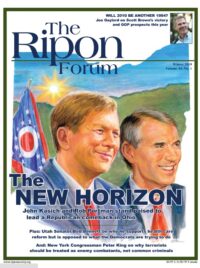
Any conversation about moderates in the 111th Congress begins by focusing on the Blue Dog Democrats in the U.S. House. Although centrist Senate Democrats wield more power, the cleverly named Blue Dog Coalition gets the lion’s share of attention. And let’s face it, the House Blue Dog Democrats, those fifty or so fiscal conservatives on the right side of their party, have had a great ride.
Established in the wake of the 1994 GOP takeover of the House, they have consistently won broad coverage for their various pronouncements, usually on issues of fiscal restraint, deficits, and governmental growth. During the 12 years of Republican House majorities, the Blue Dogs were a bit of a curiosity, though never a major force, in that Speaker Dennis Hastert decreed that only bills that could be passed with a strong Republican majority in the House would be brought up. Thus, negotiating with Blue Dogs – who might well have been interested – was rare on major issues.
Starting in 2007, however, the Blue Dogs appeared to gain real leverage, given the Democrats’ 35-seat margin in the 110th Congress. With about 235 Democrats in the House majority, the fifty Blue Dogs should have been able to move legislation to the right – toward what political scientists call the median point of the chamber. No question that the Blue Dogs tried to moderate their party’s fiscal policies, both on the floor and behind closed doors. But did they accomplish much? That’s another story – and a lesson, perhaps, in the difficulties of practicing moderate politics in a highly partisan age.
No question that the Blue Dogs tried to moderate their party’s fiscal policies, both on the floor and behind closed doors. But did they accomplish much? That’s another story…
Who, then, are the Blue Dogs? First, they come disproportionately from rural areas and southern states, and are thus easily stereotyped as across-the-board conservative Democrats. Second, they make up a well-organized, formal caucus in the U. S. House; would-be members must apply to join (some are rejected), members must attend most meetings to remain in good standing, and 60 percent approval is needed to endorse a coalition position. Although these legislators maintain strong ties to each other, it is their stated commitment to fiscal restraint that gives the Blue Dog Coalition its potential clout.
As veteran Rep. Dennis Moore (D-Kansas) observed, “Our focus is key – on the economic issues of balanced budget and paying for program (Paygo). We don’t take positions on social issues.” It is no wonder that journalists turn to the Blue Dogs as a good story; they often personify conflicts inside the Democratic caucus by opposing the powerful party leadership and offering a centrist counter-narrative to that of Speaker Pelosi and a liberal majority.

Given a catchy name and a clear organizational structure, Blue Dogs provide journalists a simple way to touch base with centrist Democrats – get a quote from a leader like Mike Ross of Arkansas and move on. This is problematic in at least three major ways.
First, the Coalition is often split on given issues; second, beyond fiscal concerns, its members hold widely divergent views (say, on abortion or gun control); and third, the Blue Dogs are all Democrats. To be sure, their centrist views pull them away from their leaders on some issues, but (save for the recent defection of Alabama’s Parker Griffith) they remain members of the Democratic caucus, whose careers depend in part on how well they can work with the leadership.
Moreover, as Democrats they agree with many of their party’s initiatives. In fact, Blue Dogs almost never vote as a separate bloc to oppose a major party position. And in the three-plus years since Democrats won control of the House, it has not happened at all. From TARP to stimulus funds to health care reforms, Blue Dogs simply do not constitute a cohesive or powerful force in congressional voting.
From TARP to stimulus funds to health care reforms, Blue Dogs simply do not constitute a cohesive or powerful force in congressional voting.
Rather, their members argue that their voices are heard within the Democratic caucus, in committees, and in private conversations with the party leadership and the president. This claim of insider influence over the agenda and on specific issues is credible, but difficult to pin down.
Ironically, the Democrats’ likely loss of, say, 25 seats in the 2010 mid-term elections, would reduce Blue Dog numbers in the House, while increasing their clout. Were there 230 or so Democrats in the next congress, fewer than 20 Blue Dog defections could determine the outcome of key votes, and the Coalition might well exercise both voting and agenda-setting power.
So, does the existence of the Blue Dogs matter?
Coalition members argue strongly that it does, by bringing like-minded legislators together and providing a voice for fiscal moderates. As for impact, however, the answer is less clear. Despite the fears of some liberals and the attention of many journalists, there is little evidence that Blue Dog votes have made much of a difference. Whether they have significantly altered the Democrats’ agenda may be in the eye of the beholder, with House leaders acknowledging few adjustments and Blue Dogs seeing real modifications on given issues, such as Paygo.
In the end, actual substance may not matter much. The Blue Dog brand name is convenient for the press to use, standing broadly, if inaccurately, for all moderate-conservative Democrats across all issues. The Blue Dog narrative continues to work, even as the Coalition’s impact remains open to question.
Burdett Loomis is a professor of political science at the University of Kansas and author of a study on the Blue Dogs entitled, “Blue Dog House Democrats: Lead Dogs or Mythical Beasts?”




